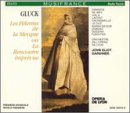| All Artists: Christoph-Willibald von Gluck, John Eliot Gardiner, Lyon Opera Orchestra, Lynne Dawson, Claudine Le Coz, Catherine Dubosc, Sophie Marin-Degor, Guy de Mey, Jean-Luc Viala, Jean-Philippe LaFont Title: Gluck: Las Pelerins De La Mecque Ou La Rencontre Imprevue Members Wishing: 0 Total Copies: 0 Label: Erato Release Date: 9/3/1991 Genre: Classical Styles: Opera & Classical Vocal, Historical Periods, Classical (c.1770-1830) Number of Discs: 2 SwapaCD Credits: 2 UPC: 022924551628 |
Search - Christoph-Willibald von Gluck, John Eliot Gardiner, Lyon Opera Orchestra :: Gluck: Las Pelerins De La Mecque Ou La Rencontre Imprevue
 | Christoph-Willibald von Gluck, John Eliot Gardiner, Lyon Opera Orchestra Gluck: Las Pelerins De La Mecque Ou La Rencontre Imprevue Genre: Classical |
Larger Image |
CD Details |
CD ReviewsGluck alla Turca Kicek&Brys | USA/UK | 03/26/2002 (5 out of 5 stars) "This winning recording proves that there is more to Gluck than his great tragic operas: he was also pretty adept at comedy too, as this fresh and breezy score shows. It may not have the emotional power of "Orfeo" or "Iphigenie en Tauride", but it is an utterly charming piece and may remind listeners strongly of another, more famous opera by another, more famous, composer...of which, more later. "Les Pelerins de la Mecque" (also known by the title "La Rencontre Imprevue", or "The Unexpected Meeting") dates from Gluck's years in Vienna in the 1760s. Oddly enough, it is an example of the French genre of `opera comique', since there was a craze for this style of music at the Habsburg court. Composers like Gretry, Philidor and Monsigny had a European-wide success in the years leading up to the French Revolution with their `operas comiques' in the late eighteenth century, but their works are almost totally neglected today. There exists a rough and ready but very enthusiastic recording of Gretry's most famous work "Richard Coeur de Lion" on the Nuova Era label, but very little else is out on disc so this work by Gluck is a rare opportunity to hear an opera of this type, and a very successful one it is too. "Opera comique" shared with Gluck's reform tragedies the feeling that a new, simpler and more direct style of music should replace the complexities and alleged artificiality of late Baroque opera (it's no great surprise that the founding father of the genre was Jean-Jacques Rousseau, the philosopher of `back-to-Nature', who also fancied himself as a composer and later advised Gluck on the revision of his reform opera, "Alceste"). "Les Pelerins" is in fact a string of short arias (some less than a minute long), ensembles and a ballet sequence all linked by spoken dialogue. Everything is fast moving and sprightly, especially in this fleetfooted performance, and nothing outstays its welcome. The plot, set in Cairo, concerns the attempts of Prince Ali to rescue his beloved Rezia from the harem of the Sultan of Egypt. This might sound familiar to many readers, and so it should, since a revival of "Les Pelerins" in Vienna in 1780, prompted the young Mozart to write his oriental Singspiel, "Die Entfuehrung aus dem Serail". In fact, the two operas had so much in common that the younger composer was accused by some of plagiarism, a charge that Gluck himself went out of his way to refute, showing warm appreciation for the new work. Naturally, Mozart's score is more sophisticated, but Gluck's possibly has more of an `oriental' atmosphere throughout, beginning with the busy overture and its clashing "Turkish" percussion. The work also has great variety, as I suggested above. The music of the lovers is on a more exalted level than that of the rest of the cast, even achieving great pathos in Ali's exquisite aria "Tout ce que j'aime est au tombeau". But they are surrounded by a crowd of comic characters, from Ali's Leperello-like servant Osmin, to an eccentric French painter called Monsieur Vertigo, who sings what sounds like a parody of the pastoral moments from Gluck's serious operas. There is also a pious fraud called the Calender who reels off one the fastest, wildest drinking songs I've ever heard, almost a match for Don Giovanni's "Finche del vino". Gluck's orchestration is light and summery, with delicate woodwind writing. Gardiner directs a lively performance and the cast sounds as fresh and youthful as the score itself. As the hero Ali, Guy de Mey copes very well with Gluck's cruelly high tenor writing, which only occasionally defeats him. Lynne Dawson's Rezia is pure-voiced and touching, especially in her big arias, "Ah, qu'il est doux" and "Maitre des coeurs". Baritone Gilles Cachemaille makes a genial Calender.
All in all, an enchanting piece in an enchanting recording.NB: This piece inspired yet another great composer to write an opera of his own. Haydn later used the same libretto, translated into Italian, for his comedy, "L'Incontro Improvviso", making certain changes to avoid clashing with the `hit numbers' of Gluck's score. It contains a delightful series of arias, recitatives and ensembles, beginning with a wonderfully unPC chorus in praise of alcohol and tobacco. Antal Dorati's recording of this opera (on Philips) made in the 1970s with an excellent cast is well worth seeking out (though it may be difficult to find) for Haydn's joyous score deserves to be better known. So does Gluck's for that matter! Why not try both?" |
